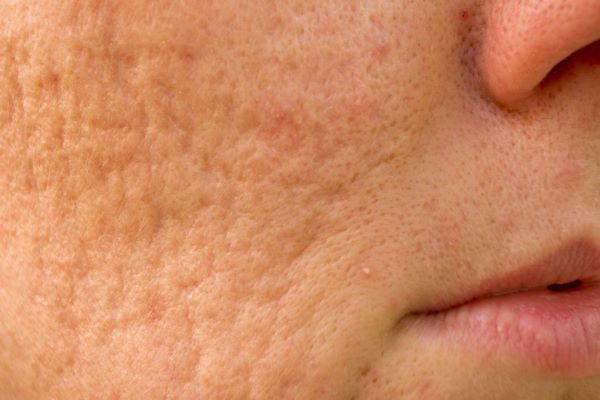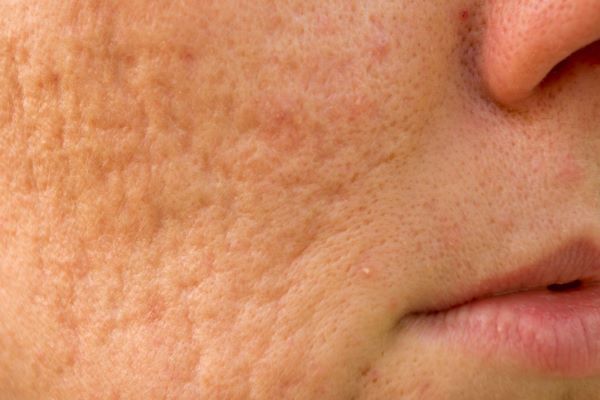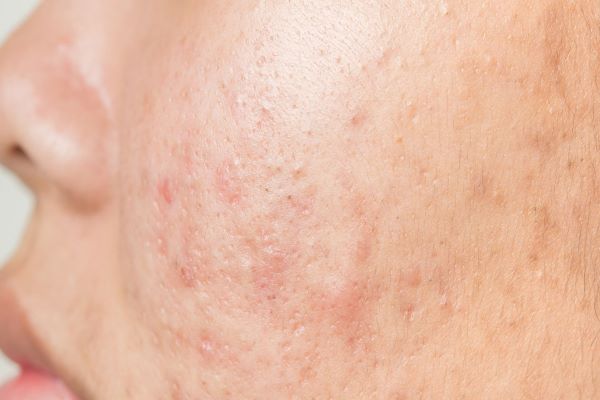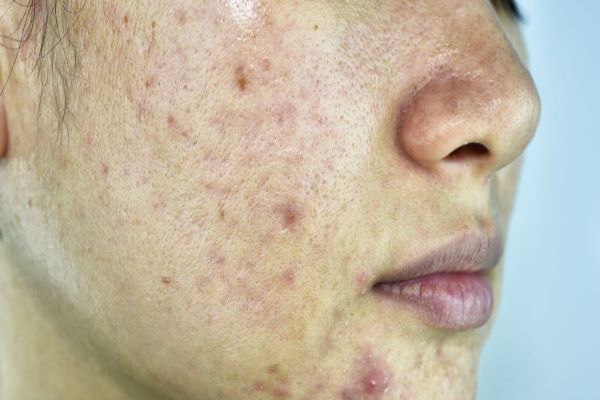Despite its many benefits, the use of lemon juice for acne scars has not been proven to be an effective treatment.
Lemon juice is often used as a natural remedy for acne. Acne is a skin condition that occurs when the pores become clogged with oil and dead skin cells. Lemon juice is thought to help clear up acne by removing the oil and dead skin cells from the pores. It is also thought to have anti-inflammatory properties that can help reduce inflammation caused by acne.
However, there is not enough scientific evidence to support the idea that lemon juice is an effective treatment for acne scars. In fact, one study found that lemon juice may actually make acne scars worse.
Despite this, some people turn to lemon juice as a natural way to improve the appearance of scars. Just be sure to speak with your doctor first to make sure it is safe.
(As an amazon associate I earn from qualifying purchases. Full discolsure…)
What are acne scars and what causes them?

Acne scars are a common side effect of acne. Acne skin condition occurs when the pores become clogged with oil and dead skin cells. When the pores become clogged, bacteria can grow and cause an infection. This can lead to inflammation, and the formation of acne scars after your acne heals.
The formation of acne scars post-acne is due to the imbalance in collagen production. Collagen is a protein that helps to heal and repair the skin. So, if your skin produces too little collagen, you’ll develop pitted scars. On the other hand, if your skin produces too much collagen, you may develop raised scars.
Some of the factors that may contribute to their development while you have acne include:
- Your type of acne.
- The severity of your acne breakout.
- How long your acne has been present.
- How you treat your acne.
Types of acne scars
There are three main types of acne scars:
1) Atrophic scars: These are the most common type of acne scars. They occur when there is a loss of tissue and can appear as small depressions in the skin post-acne.

2. Hypertrophic scars: These scars occur when there is an excess of tissue. They can appear as raised, thick, or keloid scars post-acne.

3) Postinflammatory hyperpigmentation: This is a type of scar that occurs when there is an increase in skin pigment. It can appear as a dark spot on the skin after your acne heals.

How lemon juice is often used as a natural remedy for acne and acne scars
While store-bought or prescribed treatments, as well as laser and surgery options, exist for addressing acne and scars from it, some people instead opt for natural remedies such as lemon juice.
Lemon juice is a natural astringent, meaning that it helps to tighten the skin and reduce the appearance of pores. It also contains citric acid, which helps to exfoliate the skin and remove dead skin cells. Additionally, lemon juice is high in vitamin C, which is beneficial for the skin.
When lemon juice is used as a natural remedy for acne, some people prefer to apply it directly to the skin while others dilute it by mixing it with water, oatmeal, or yogurt and then use it as a facial wash. It is important to note that lemon juice can cause sunburn if it is applied to the skin before going out in the sun, so it should be used with caution.
The pros of using lemon juice for acne scars
Despite minimal scientific evidence to support it, some people believe that lemon juice is an effective treatment for acne scars.
Here are some of the pros of using lemon juice for acne scars:
- Lemon juice is a natural astringent that helps to tighten the skin and reduce the appearance of pores.
- It contains citric acid – an alpha hydroxy acid (AHA), which helps to exfoliate the skin and remove dead skin cells.
- It is a rich source of vitamin C (ascorbic acid), which is beneficial for skin health.
- It contains antioxidants that help to protect the skin from damage caused by free radicals.
- It helps to boost collagen production, which may help to reduce the appearance of scars (safer drinking it than applying it directly to the skin).
- It is a cost-effective and easy-to-use remedy that can be used at home.
The cons of using lemon juice for acne scars
Just like any other remedy, lemon juice has its own set of cons when it comes to using it for acne scars.
Here are some of the cons of using lemon juice for acne scars:
- It can cause skin irritation such as redness, stinging, burning, and peeling.
- It can make the skin more sensitive to sunlight, which increases the risk of sunburn.
- It may not be effective in reducing the appearance of scars.
- It can be messy and difficult to apply.
- It can be expensive if used regularly.
How often should you apply lemon juice (If You Insist)?
If you insist on using lemon juice to treat your acne scars, it is important to do so safely and correctly.
Lemon juice should be applied two to three times a week at most. It should not be applied more than that, as it can cause skin irritation. Additionally, lemon juice should not be applied before going out in the sun, as it can increase the risk of sunburn.
To minimize the risk of skin irritation, lemon juice should be diluted with water or another substance such as yogurt or oatmeal. It should then be applied to the skin with a cotton ball or swab and left on for 10-15 minutes before being rinsed off.
How to decide if lemon juice is right for you
If you are considering using lemon juice to treat your acne scars, there are a few things you should consider before making a decision.
Be aware of the side effects
Lemon juice can cause skin irritation such as redness, stinging, burning, and peeling. So if you have sensitive skin, it is important to do a patch test before using it on your whole face.
Do a patch test
To do a patch test, apply a small amount of lemon juice to a small area of your skin, such as the inside of your arm or elbow at the bend. If you experience any irritation after 24 hours, it is best to avoid using lemon juice on your skin.
Decide how frequently you need to use it
Lemon juice can make the skin more sensitive to sunlight. So if you are planning on using it regularly, it is important to use sunscreen and limit your time in the sun. You may want to consider an alternative if you are looking for a product to use every day – using lemon juice daily could increase your risk of skin irritation and sunburn.
Lack of sufficient scientific evidence
Finally, it is important to consider whether or not lemon juice is actually effective in reducing the appearance of scars before using it. Unfortunately, there is not enough scientific evidence to support the claim that lemon juice can help to reduce the appearance of scars.
So if you are considering using lemon juice to treat your acne scars, it is important to do so with caution and to be aware of the possible side effects.
Speak with a dermatologist
It is important to speak with a dermatologist before using any home remedies, as they can provide guidance on whether or not a particular remedy is right for you.
Treatment options that your dermatologist can recommend
Dermatologists can present a variety of treatment options for acne scars. Some of these options include:
- Topical treatments such as retinoids, tretinoin, benzoyl peroxide, and salicylic acid
- Laser therapy
- Chemical peels
- Microneedling
My final thoughts
Although lemon juice has its own set of cons when it comes to using it for acne scars, it may still be a viable option for some people despite the lack of sufficient scientific evidence to support its use.
It is important to do a patch test before using it on your whole face, to make sure you don’t experience any skin irritation. It is crucial to be aware of the side effects that can occur, such as skin irritation and increased sun sensitivity.
Additionally, if you are considering using lemon juice to treat your acne scars, it is important to speak with a dermatologist before doing so, to get guidance on whether or not it is the right option for you.
And finally, your dermatologist could recommend other non-natural treatment options for your acne scars that are far more effective than using lemon juice.
Leave a comment below if you have any thoughts or experiences with using lemon juice to treat acne scars!
